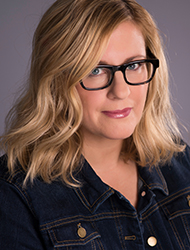Amy Bass is the author of the new book One Goal: A Coach, A Team, and the Game That Brought a Divided Town Together. It focuses on the Somali immigrant community in Lewiston, Maine. Her other books include Not the Triumph But the Struggle and Those About Him Remained Silent. She is a professor of history at The College of New Rochelle, and her work has appeared in a variety of publications, including Slate and Salon.
Q:
Why did you decide to write about this team of mostly immigrant soccer players
from Lewiston, Maine, and given the current political climate, what do you
think their story says about the role of immigrants and refugees in the United
States?
A:
I went to Bates College, which is in Lewiston, so I lived there years before
the Somali community began to arrive. When the soccer team started to climb the
national rankings in fall, 2015, a friend from college posted a newspaper
article about them on Facebook.
Things
in my head just began to click – there was so much heated dialogue at that moment
about refugees; Syria was such a focal point; U.S. governors were saying “we
don’t want you” about those who were fleeing Syria’s terror and violence.
But
in Maine, these guys were playing soccer, making it work, coming together as a
team, coming together as a community. This, I thought, is how America lives up
to all those revered documents we keep in the National Archives.
There
was – there is – so much fear driving and dividing this country. This story, I
think, puts that fear into a context, with a thrilling sports story to boot.
Q:
How did you research the book, and did you learn anything that especially
surprised you?
A:
I spent a lot of time in Maine! I did a lot of research to prepare for my first
trips up there – reading, reading, and then more reading. Newspaper clippings,
histories: you name it; I read it.
I
watched hours and hours of game reels -- everything and anything I could get my
hands on. A LOT of soccer. And I went back to high school, shadowing Coach
McGraw, who teaches biology; hanging out at football games and track meets; and,
of course, attending the soccer games, first as a spectator, then on the
sideline, and finally from the locker room.
I
did endless hours of interviews, with players and their families and community
members, all of whom so generously told me their stories, patiently answered my
questions, and – when I was really lucky – invited me to dinner.
I
think what surprised me most was how seamlessly they accepted me – I didn’t
even really notice until one afternoon I was like, whoa – I’m in the locker
room!
Q:
Do you see the events you write about in One Goal as relevant to many other
communities, or is Lewiston's experience unusual?
A:
Lewiston has some unique elements to it, to be sure – but I think there are
things we can all learn from its story. Lewiston has this big moment – this
soccer game – that gives us all a glimpse as to what things could be like. I
hope all communities can find their moment.
Q:
You wrote recently on CNN.com, "But just as these families needed
Lewiston, the nearly all-white former mill town needed them, too." How
would you describe the relationship between the immigrant community and those
who had lived there for longer, and what do you see looking ahead?
A:
I think community relationships are negotiations – and that’s a good thing. It
is so much more complex than an immigrant community “fitting in.” It is about
the preservation of culture and language and food and dress and religion, all
key things to figure out how a group lives where it settles.
Coach
McGraw often compares his players to seeds – they will grow, and the community
will grow with them.
Q:
What are you working on now?
A:
I’m working on figuring that out. I’ve always got ideas in my head, it just
depends which one will stick.
Q:
Anything else we should know?
A:
I say this all the time: listen to athletes for a change. And I really mean
that. Sports can do one of two things:
pull people together, or push people apart. But either way, sports
matter.
--Interview with Deborah Kalb




No comments:
Post a Comment